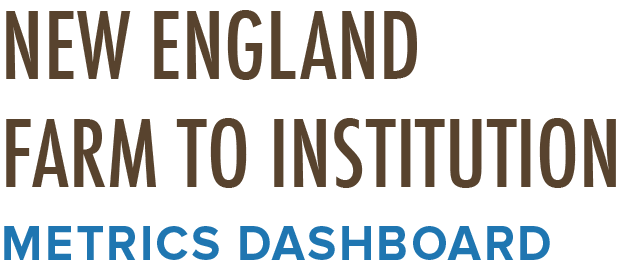COMMITMENTS & PLEDGES
We hope that the dashboard will be a useful tool for anyone who chooses to look at it, including those who are not food systems “experts.” For those who would like more context, we have developed these introductory resources. Data and materials here are about the whole New England food system (not just the part related to institutions).
On this page, we have gathered together a small number of diverse indicators that show how New England states and institutions are putting their commitment to a regional food system into action through by implementing innovative programs, signing pledges developed by good food advocates, and hiring dedicated sustainability staff.
Higher Education
Campus wide initiatives and programs to improve sustainability are widespread. The three programs highlighted here provide tools and resources to campus administrators to meet sustainability goals. Many of these efforts are improved by enthusiastic student participation.
Real Food Challenge
Real Food Challenge is a national network of student food activists that works to shift university food budgets away from industrial farms and unhealthy food and towards local and community-based, fair, ecologically sound and humane food sources. When a university signs the Real Food Campus Commitment, colleges and universities pledge to buy at least 20% “real food” annually by 2020. Across New England, 12 campuses have signed the Real Food Campus Commitment.
Source: Real Food Challenge website
Association for the Advancement of Sustainability in Higher Education (AASHE)
The Association for the Advancement of Sustainability in Higher Education (AASHE) promotes sustainability programs and leadership on college and university campuses. One way they do this is through their Sustainability Tracking, Assessment & Rating System (STARS), which is a transparent, self-reporting framework for colleges and universities. AASHE STARS is a transparent, self-reporting framework for colleges and universities to measure their sustainability performance. Aspects of sustainability include: academics, engagement, operations, planning and administration, innovation and leadership. Food and beverage purchases are tracked, rated, and assessed under the operations category. In New England, there are currently 65 AASHE members.
Source: AASHE Member Directory
American College & University Presidents’ Climate Commitment
Second Nature is a nonprofit organization that works to accelerate climate action in higher education. Through their Climate Commitment, college and university presidents affirm the role that higher education institutions should take in creating a sustainable future and agree to develop a comprehensive climate action plan. Plans include a path towards achieving carbon neutrality and increasing resilience in the face of climate change.
Source: Second Nature / ACUPCC
Photo courtesy of the USDA
K-12 Schools
Kindergarten through 12th grade schools and educators are setting a new standard for food system and nutrition education. Through innovative programming, students participate in school gardens, eat local foods in the cafeteria, and learn about agriculture and healthy eating.
Farm to school networks provide schools with resources and expertise to integrate local purchasing and food education. Currently, there are statewide farm to school networks in Massachusetts, Vermont, Rhode Island, Connecticut, New Hampshire, and Maine.
FoodCorps
FoodCorps is an AmeriCorps program that connects kids to real food and helps them grow up healthy. FoodCorps service members serve alongside educators and community leaders and partner with schools to create a nourishing environment for all students. They do this by providing students with food and nutrition education, hands-on activities like gardening and cooking, and help to get lunch trays filled with nutritious meals from local farms.
Source: FoodCorps Website
Health Care
Health Care Without Harm
Health Care Without Harm’s Healthy Food in Health Care program works to improve the environmental sustainability, nutritional quality, social justice, and animal welfare aspects of food served in hospitals. Through the Healthy Food in Health Care pledge, food service management companies and hospitals follow a framework to “improve the health of patients, communities, and the environment.” Some of the steps include: reducing the amount of meat served; choosing meat raised without routine antibiotics; committing to more local food purchasing; and offering nutrition education. In New England, 71 hospitals have signed the Healthy Food in Health Care pledge.
Source: Health Care Without Harm website
Community Food Systems
Food Policy Councils
Across New England, food policy councils, local governments, and concerned citizens are building food systems that provide healthy, sustainable food to local residents. There are 29 food policy councils across the region. Food policy councils create recommendations and advocate for healthy food policy. To learn more about councils in New England, visit the Johns Hopkins Center for a Livable Future map of food policy councils.
Source: Johns Hopkins Center for a Livable Future map of food policy councils






